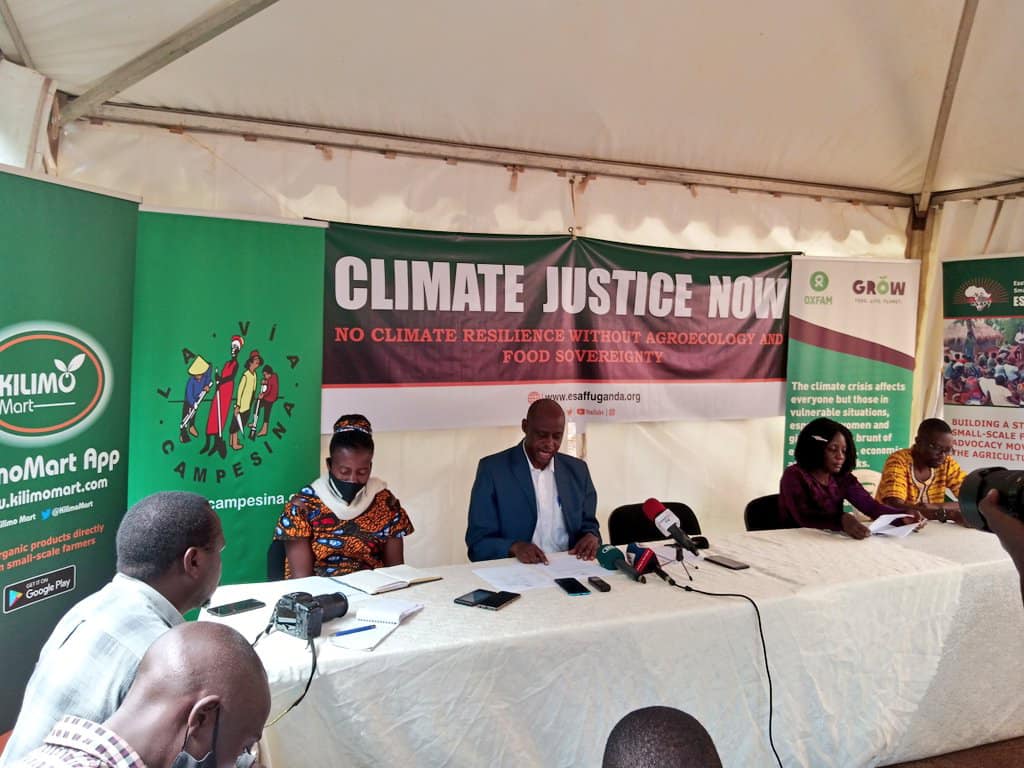No climate resilience without agroecology and food sovereignty

ESAFF-Uganda Press Release
Kampala, Uganda: 6th November 2021
The 26th UN Climate Change Conference of Parties (COP26) hosted by the UK in partnership with Italy, is taking place from 31 October to 12 November 2021 in the Scottish Event Campus (SEC) in Glasgow, UK. The summit has brought parties together to accelerate action towards the goals of the Paris Agreement and the UN Framework Convention on Climate Change. Parties are reviewing the progress made in the fight against the climate crisis after the Paris Agreement signed in 2015, where nationally determined contribution targets were presented by parties for reducing emissions. The summit is further set to focus on rapid reduction of global emissions, and climate finance among others. Countries will make new commitments in the fight against climate change amid rising calls for stronger action to limit the global temperature rise.
As we commemorate 25 years of progress toward food sovereignty, the COP 26 agreements fall far short of ensuring a food system that feeds people in a way that is sensitive to different types of food, production conditions, and the relationship between this food and production processes with labour, the environment, and local and indigenous communities. We emphasis that agroecology is a critical component of the transition and that market-based solutions will not provide climate justice. We strongly believe that agroecology achieves climate justice, based on our own small scale farmers’ experience.
According to our experience, the pests, vectors, diseases, floods, landslides, lightening, and prolonged droughts sparked by climate change across Uganda coupled with the pandemics bring to light the emergency of climate crisis facing the planet at the time of the 26th Conference of the Parties to the United Nations Framework Convention on Climate Change (UNFCCC), COP26. We strongly believe that small-scale farmers therefore must be at the heart of the Global Climate Crisis Negotiations given the impact that climate change makes on agriculture and the livelihood of small-scale farmers especially women in the rural areas of Uganda.
On this day 6th November, 2021, which is the Global Day of Action for Climate Justice, ESAFF Uganda joins other indigenous communities, trade unions, feminist movements to air a loud and clear voice to the world leaders discussing our future: We want Climate Justice Now! ESAFF Uganda strongly believes that agroecology achieves climate justice with proven serious solutions to climate crisis crucial for climate mitigation and adaptation. Agroecology is key to small-scale farmers because it strengthens livelihoods and fosters collective actions to addressing the climate crisis and employs agricultural methods, such as diversification of crops, conservation tillage, green manures, natural fertilisers, biological pest control, rainwater harvesting, and production of crops and livestock in ways that store carbon and protects natural resources. Agroecology is gaining traction as one innovative approach to meet our current needs without jeopardizing those of future generations to sustain themselves, while at the same time delivering healthy diets, biodiversity conservation, contributing to reducing the negative effects of climate change, and ensuring just and inclusive food systems that leave no one behind (Caron et al., 2018). In short, agroecology is well positioned to help countries meet multiple Sustainable Development Goals (SDGs).
Therefore, small-scale farmers emphasize that Agroecology achieves climate, social and ecological justices, hence making the following calls to the Parties of the UNFCCC at COP26;
1. Address the current financial limitations which is affecting the implementation of policies and programs that are focused on addressing climate change in an ecological friendly manner. We call on parties to desist from funding climate change policies and programs that don’t protect food sovereignty in Uganda. We stress that funding should be with shorter timeframes since commitments towards emission reduction and climate finance is urgent.
2. Parties should urgently prioritize climate information access, sustainable and adaptive food systems rooted in agroecological systems.
3. Parties should focus on prioritization of adaptation in Uganda’s programs of action in Nationally Determined Contribution.
4. Parties should support the domestication of the United Nations Declaration on the Rights of Peasants and Other People Working in Rural Areas (UNDROP) which set platforms for voices from rural communities to be heard. When implemented- UNDROP would be key in addressing the economic, social, cultural, and political dimensions of climate change and human rights.
5. Align awarding criteria and procedures of financial mechanisms such as the Green Climate Fund to small-scale farmers and their organizations so that farmer organisations can access available funding given their capacity to mobilizing small-scale farmers especially women and youths and building workable grassroot climate adaptation and mitigation measures.
6. Parties should purposefully invest resources both technical and financial in research on agroecological approaches like resilient agricultural practices that are being nurtured by small-scale farmers. These approaches respect traditional knowledge and promote food sovereignty.
7. Parties should create a direct platform to the UNFCCC that actively involve small-scale farmers especially women as a special group that experience the daily impact of the decisions and actions by policy makers and implementers on climate change.
8. Parties should further strengthen youth capacity through empowering youth to access skills development to create business opportunities in areas that protect and restore ecosystems. This will play a big role in supporting climate and sustainable development ambitions.
Media Contact
National Coordinator,
Ms Nancy Walimbwa Mugimba
Email: nmugimba@esaffuganda.org
Phone: +256 414 533 764
Website: https://esaffuganda.org/
Eastern and Southern Africa Small-scale Farmers’ Forum (ESAFF) Uganda is the largest small-scale farmer-led policy influencing movement in Uganda. ESAFF Uganda was established to nurture the participation of small-scale farmers in sustainable development processes, for self-reliance through advocacy, capacity building and institutional development. ESAFF Uganda is a membership organisation with members in 54 districts in Uganda. ESAFF Uganda is also part of a bigger network of small-scale farmers’ organisations (ESAFF) in other 15 countries in eastern and southern Africa. ESAFF Uganda is also a member of La Via Campesina (LVC) which is the largest peasant movement in the world
